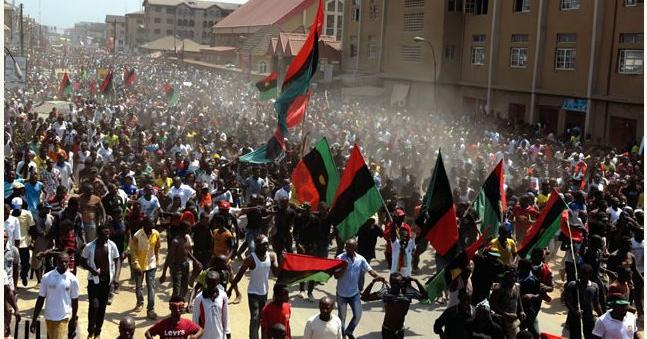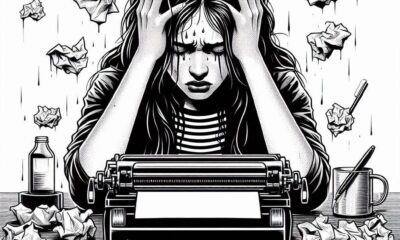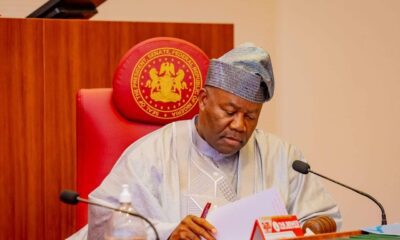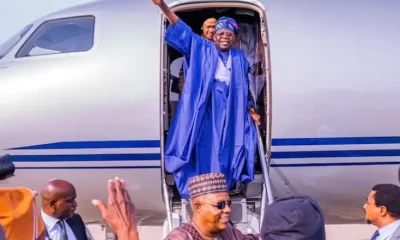National Issues
“The Nightmare Begins”: Reconciling IPOB’s struggle with history. –By E.O. Ojelabi

“It is crucial to note that the decision of an entire people, the Igbo people, to leave Nigeria did not come from Ojukwu alone but was informed by the desires of the people and mandated by a body that contained some of the most distinguished Nigerians in history: …” Chinua Achebe – There was a country: A Personal History of Biafra.
Achebe’s work detailed the history of Ojukwu’s 1967 proclamation of the State of Biafra. An analysis of the result of this move and its immediate trigger is briefly discussed elsewhere. This short appraisal attempts a critique of recent insecurity developments in the southeastern region of Nigeria, identifying the silent or vocal local sympathy for the growing insurgency and highlighting its unintended eventualities. It starts with a strategic description of the Biafran War intended at explaining the strategic basis for the decision for war. It further goes into analysing the recent insurgency developments in the southeast as a similitude of an earlier catastrophic thinking. It concludes by highlighting ways to achieve the political desires of the southeast, examining the role of socio-cultural groups, and emphasizing due process, and strategic reasoning.
Atofarati, in his discuss on the causes of and strategies deployed in the Nigeria Civil War, commented on the military strength of Biafra before hostilities that:
“Before the outbreak of hostility, the Eastern Region had no sufficient arms since all the soldiers who returned to the region did so without their arms while the soldiers who were withdrawn from the East departed with their weapons. What was left of the Nigerian Army at Enugu barracks amounted to about 240 soldiers, the majority of them technicians and tradesmen and not all the soldiers had weapons.”
This was the situation of the Biafran army before May 1967 when it was able to secure weapons from her sympathizers majorly from France, Czechoslovakia and Portugal through Ivory Coast, Gabon, Senegal, and other African sympathizers. By May 1967, a Biafran military of over 30,000 populated by farmers, students, lecturers, and young artisans was hurriedly trained by mercenaries from South Africa and Belgium. N.J. Miner and Atofarati both agreed that the Nigerian Army (NA) had grown in hundreds of thousands between 1967 and 1970 with at least 180 officers as of 1967 against Biafra’s 27. The NAF had a score of the British Scorpion tanks, Saladin Armoured Cars, about 20 single-engine aircrafts, 12 helicopters and about 10 Russian MiG 17 and Ilyushin II-28 bomber jets while the Biafra side brandished her B26 and B25, 3 helicopters, 3 MiniCOIN bombers, 2 planes and “a few light weaponed boats” at her Calabar Navy.

E.O. Ojelabi
The Biafran side had hoped to defend her acclaimed territories of the Southeast via creating a buffer zone with parts Midwestern region and the creeks of the Warri/Asaba gateway into the east from her Western borders. There was no real strategy against invasion from the northern or southern borders via Ogoja and Enugu; Bonny, Port Harcourt and Calabar respectively. The northern borders, therefore, crumbled by the 10th of July after an earlier repelled offensive made possible by an impressive minefield and fortified pillboxes ambush Biafran defensive. On the Southern front, Bonny was taken back immediately after the Nigerian Navy took control of littoral fronts by 26th July 1967. The Nigerian Airforce bombardment took control of the country’s airspace with its superior crafts. The war fought between September 1967 and 1969 was focused on the Western front and was allowed for by the terraneous advantages for guerrilla tactics provided by the midwestern region and the Warri/Asaba creeks and the Agbekoya crisis in the Western Region 1968-69 which very much divided the attention of the NAF on the Biafran Western front. At the end, attrition spelled doom for the Biafran side. This realisation riddled the thoughts of Raph Uwechue, an integral officer in Biafran struggle. He said:
“In Biafra two wars were fought simultaneously. The first was for the survival of the Ibos as a race. The second was for the survival of Ojukwu’s leadership. Ojukwu’s error, which proved fatal for millions of Ibos, was that he put the latter first.”
Knowing this may happen from the inception, Achebe recounted the reason the elite group described above decided for war anyways:
“No small number of international political science experts found the Nigeria-Biafra War baffling, because it deviated frustratingly from their much vaunted models. But traditional Igbo philosophers, eyes ringed with white chalk and tongues dipped in the proverbial brew of prophecy, lay the scale and complexity of our situation at the feet of ethnic hatred and ekwolo – manifold rivalries between the belligerents.”
Achebe further described thoughts in Igbo intellectual circles that the war could have been avoided or at least, had a better course if Ojukwu was not the leader at this crucial time in the history of the Igbo nation and that its futility was apparent before hostilities or at least, by September 1968. These are testimonies of people who witnessed war and its wanton destructiveness.
The grievances of the Igbo nation manifest in groups like IPOB and ESN and the response of the Nigerian government has been fairly addressed here. However, recent developments are disturbing. Like the 2006-2009 northeast challenge, even though denied, IPOB and her ESN have been fingered to have perpetrated heinous crimes against the state in brazen and lawless attacks on police stations, police and military men at checkpoints, barracks, and prisons. “Unknown gunmen” have executed and are still executing indiscriminate killings of uniformed men in the Southeastern States of Imo, Abia, Ebonyi, Anambra, and South Southern States of Rivers and Cross Rivers. Building up in the Southeast is a momentum to an “insecurity tsunami” and the recent kidnapping of Abia State University Students (ABSU) in the fashion popular in the rudderless Northwest is an unacceptable low. In the scampering of security men for fear of their lives, Igbo individuals who have taken up unsolicited responsibility of domestic security have been equally mortally attacked by these “unknown gunmen” further entrenching the optics of a local drive to rid all apparatus of order, unless of course, that premeditated under the banality of the “half of the yellow sun”.
There is little doubt to the fact that the latest insurrection in that part of the country enjoys public sympathy rooted in the abundant feelings of marginalization, systemic subjugation, inequity, and injustice espoused by the Buhari led government. The mammoth rallies of 2017 – 2019 and the many boycotts around the same time considerably executed by IPOB speaks to this reality. This domestic support gained much from the controversial 2019 elections and the Fulani herdsmen problem escalated by Abuja’s indiscretions. However, at this stage of the conflict, it is important to query Southeasterners on their readiness to pay the price.
Let’s ponder on these. 2009 was just like any other year in the North; Maitatsine had risen and had been crushed 1979-80, Akaluka had been murdered by religious zealots in 1995, Sharia had been enshrined in 1979-99, life could not be better, the faithful could live in that pious city of biblical; or maybe even present-day “Jerusalem”. The students and political actors who morphed to RUF in Freetown before 1991 once gyrated in the hysteria of APC’s political turmoil. Adrenaline was pumping at just the needed level to sustain “the perfect storm” – speaking of which – the Taliban was once a beautiful bride in the shade of the Mujahedeen in present-day Afghanistan. Northern Uganda once applauded the Lord Resistance Army (LRA) when political interests aligned. In all these cases and more, one occurrence is ubiquitous, “the monster always grows to demand the blood of its offspring.”
Attrition is rather a great equaliser. It often changes the dynamics of even the best-planned wars. To better illustrate this is Adiche’s portrayal of ‘Ugwu’s character, a promising young man with so much life, love, and ideas of morality whose very foundation of ethics and morality was brutally reconstructed and unceremoniously sordid by the realities of war. The recent most relatable story of this exact tragedy is the story of Dominic Ongwen otherwise referred to as the “White Ant”. Kidnapped innocent, as a child of 14 years and turned into a murderous beast in Northern Uganda. The monster this brewing insurrection in the Southeast would morph into will equally be uncontrollable and all “stakeholders” in the region should aggressively resist all attempts to turn their peaceful cities into another northeast or northwest, in the state of complete anarchy.
What generates these grievances and where is justice? The Nigerian case is a sad ode of circumvention and blatant criminality which has led to the mindless plundering of her resources. This is not to point to a particular lack of structural or official medium of syphoning the state’s commonwealth to its “federating” or in the least, politically acceptable quarters. It speaks to the circumvention of these structures by corrupt and willing public servants who form the Marxist “superstructure” created and sustained through the local dynamics of their domestic polities. An example of this complication is the recent James Ibori loot, called for by quarters of an exonerating yet convicting Delta State at the prospect of the same money not returned to “source” having claimed its ambidexterity. The politics that led to the creation of the Niger Delta Development Commission (NDDC) is another funny yet instructive analogy of this pathetic reality. While agitations for the development of the country’s “oil bank” engulfed the area in militancy and threatened to cripple the Nigerian economy, the funds released for such exercise found itself building private enterprises in the names of warlords disguised as “freedom fighters” with zero benefits to the affected locals. The latest and funniest of news from that area is the pathetic loss of breath of officers of the NDDC in the face of accountability which unfortunately led to the shameful shutting of the “microphone”.
State governors appropriate billions annually in the nebulous security vote and yet claim they have no control of the domestic security of their states despite their constitutionally recognized role as the Chief Security Officer (CSO) of their respective states. They receive federal allocations meant for local governments and the judiciary of their states and monies meant for budgetary executions from the archaic and frankly beggarly joint federal accounts. These monies are meant to be each state’s “share” from the archaic joint federal treasury and the governors have successfully used the funds to pocket the local government and judiciary nationwide. This is not to mention the grants and monies also appropriated by representatives of these states at the federal legislative houses through spurious constituency projects and contracts. This national superstructure is replicated at the state and local government levels with absolutely no accountability. The paradox of this damning reality is that elements from these states claim economic marginalization and inequity somehow acquitting and/or neglecting their governors and other domestic political actors. What marginalization? From where or who?
It is apparent that in the Nigerian situation, ignorance of the masses more than anything else is the bane of her problem. The electorate is a set of gullible and impressionable people who have little interest or knowledge in and of the political process of their polity but will react like puppets to the inciting fingers of their local elites regardless of facts available. The agitations of Southeasterners or any other parts of the country are not irreconcilable with the Nigerian constitution even a referendum. The problem therein is political apathy and blatant ignorance. The crowds commanded by the rallies organised by IPOB in 2017-19 which sent jitters down the spine of Abuja, the APC, and other gatekeepers and political rentiers could and should be put to better use. Whatever marginalisation complained of in the region is aligned with the political interests of their Governors, Senators, HOR members, their Local Government Chairmen, and Ward Councillors. If the will of all these political actors can be aligned with the interest of their people, there will be no limit to what can be politically achieved. Unlike Ojukwu’s mistake, it will be a process recognised by law, orderly, and easily amenable with cosmopolitan and humanitarian goals. In the case where the people are agitated and their political actors are indifferent, it will only lead to insurgency, insurrection and consequent mindless killings like the ones going on in Orlu and other parts of the Southeast. Instead of steering to a war which only use is the destruction and defacement of the Southeast, due political process should be reasonably embraced.
Socio-cultural groups in Nigeria are guilty of retail activism in the country’s larger transactional politics. This engenders therefore, activism without popularity or policy direction or solution to issues integral to the local masses or their vaunted ethnic nationalities. The result of this is dysfunctionality. These groups such as Afenifere, Ohanize N’digbo, Arewa Consultative Forum among others should be driving informed national policy changes and regulations like the INEC Act Reform with initiatives like the Voter’s Card Issuance, Electronic Voting, followed by close monitoring and pressure on the government on issues of national politics as it affects the different socio-cultural groups they claim to represent in the Nigerian polity. Instead of exacting influence on the elections and contesting popularity to entrench their authority on nationalistic politics, these groups speak in chaotic voices from the rear and only retains relevance through the media and banal retailing until the emergence of IPOB in 2012 which has since shown, to the surprise of the Nigerian political elites, that it is a radical departure from the norm.
IPOB and the people of the Southeast can start a peaceful political wind in Nigeria even without the name, IPOB. Senators and HORs members whose interests are not aligned with the people can be recalled and replaced with ones who will carry their interest to the national platforms with the full strength of the law and accountability to the people. This process can be replicated at the state level, recalling members of the State’s House of Assemblies (SHA). It was done in 1953 for Nnamdi Azikwe’s political ambition and can be repeated in our times lawfully. An aligned SHA can be used to peacefully unseat any Supreme Court imposed Governor without any need for killings. The quest of Southeasterners and indeed, the rest of the country can only be achieved through a synergistic approach by the people and their local political actors, only this time, the elites/public officials must be made to be responsible and accountable. Without this process, agitations are useless in the present Nigerian situation where “Abuja” has no visible value for human life and is largely irresponsible for the safety of its citizens. The Southeast is presented with the options of life and death, but here she is advised to choose life because a successful ignition of this sort of political consciousness in the East will lead to the political wildfire that will light the path to the country’s political future.
E.O. Ojelabi, M.A.
Contact @ ojelabiemmanuel@ymail.com



















